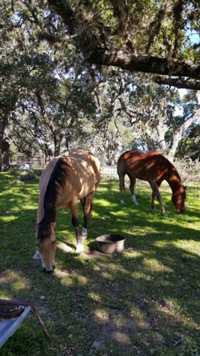December 2020
Holistic Horsekeeping
How to have a healthy happy horse.
Volume 25, Number 12
=*=*=*=*=*=*=*=*=*=*=*=*=*=*=*=*
In This Issue:
1. Holistic Horse Health: Is your horse getting his greens?
2. Holistic Horsekeeping Resources
=*=*=*=*=*=*=*=*=*=*=*=*=*=*=*=*
1. Holistic Horse Health: Is your horse getting his greens?

Horses thrive on quality grass but how many actually have access to pasture on a regular basis. These days, not many! High land values have forced horses into smaller and smaller acreage and some horses with access to pasture can’t have it because of metabolic imbalances. Fresh, well cured grass hay is becoming harder to get with ongoing drought conditions in much of the country. So how is a horse supposed to get his greens?
I have found one of the best ways for a horse to get his greens is to include algae in his diet. Twenty years ago people looked at me like I was a Martian when I suggested they feed their horse algae. Now most just nod their head yes. You see, in the past 20 years nutritionists have come to realize the amazing value of algae, in particular, microalgae. Here are a few qualities that most food source microalgae share and then we can look at their individual qualities.
- Easy to digest with modern processing methods
- Cleansing to the liver and kidneys due to chlorophyll content
- Build blood due to chlorophyll and iron content
- Prebiotic to support healthy gut bacteria
- Good source of beneficial fatty acids
Now let’s look at the three most popular microalgae and compare their benefits.
Spirulina
- Highest in protein
- Highest source of Vit A in the form of beta carotene
- Salty flavor
- Cooling energy
- Builds yin fluids in the body
- Cell wall supports healthy connective tissues, decreases inflammation and lowers fat levels in the blood
- Requires a larger dose than Chlorella or AFA
- Contains phycocyanin to support brain function and discourage tumor growth
- Not a good choice for cold or damp conditions
Chlorella
- Lowest in Vit A in the form of beta carotene
- High in a specialized nucleic acid called Chlorella growth factor which keeps cells healthy
- Cell wall binds toxins so they can be removed from the body and supports immune function
- Least cooling and most tonifying for weak individuals
- Highest in beneficial fatty acids
- Does not contain phycocyanin
AFA
- Wild grown in natural environment
- When carefully processed enzymes are still present in product
- Very bitter flavor which supports the nervous system and provides a sense of well being
- Highest source of chlorophyll
- Drying
- Cooling
- Builds Yang energy
- Contains phycocyanin and phycoethrocyanin
You can see how the microalgae as a group are very beneficial but let’s look at which would be best for your horse.
Spirulina would be a good choice for a Metal or Water horse with overall good energy but who shows some mild inflammation of his joints or connective tissues. Spirulina would not be a good choice for a sluggish or overweight horse that showed a tendency to stocking up or other tissue swelling.
Chlorella would be a good choice for an older horse with low energy and generalized weakness
Chlorella would not be the best to increase beta carotene or Vit A levels
AFA would be a good choice for a hard working performance horse or any horse with good energy that did not have access to quality pasture.
AFA would not be the best choice for an old frail horse with generalized weakness and failing systems.
The source of microalgae is critical. Chlorophyll will degrade rapidly after algae is harvested. If the harvested product is not handled in a specific way it can contain degraded chlorophyll which is toxic to the liver. All good microalgae should have a bright green color and smell like fresh cut grass.
So now that you know how beneficial algae can be there is no excuse for your horse ever missing his greens.
2. Holistic Horsekeeping Resources

To learn more about caring holistically for your horse, get the Holistic Horsekeeping book from Madalyn Ward, DVM. It is available on her website in paperback, or on Kindle in digital or paperback formats. You’ll also find online courses, ebooks, audios, DVD’s , books and Kindle books at https://holistichorsekeeping.com/education.html; or the horse temperament typing online class at https://horsetemperament.com/class.html. We also offer a library of articles, a blog full of information, a mentoring program, consults with Dr. Ward, and a variety of equine products Dr. Ward recommends and uses herself. From education to natural supplements, we have it all at www.holistichorsekeeping.com.
++++ Copyright | Getting On and Off the List ++++
Unless otherwise attributed, all material is written and edited by Madalyn Ward, DVM. Copyright (c) 2020 HolisticHorsekeeping.com and Madalyn Ward, DVM. All rights reserved.
If you like the material in this newsletter please let your friends know about it. You may reprint material in other electronic or print publications provided the above copyright notice and a link to http://www.holistichorsekeeping.com is included in the credits.
You can get off this list by sending an email to info@holistichorsekeeping.com.
When you forward this material, please send the entire newsletter. Thanks!
Please also enjoy all of Dr. Ward’s web resources:
http://www.holistichorsekeeping.com
http://www.horsetemperament.com
http://blog.horseharmony.com
https://www.facebook.com/HolisticHorsekeeping
https://www.facebook.com/HorseHarmony
Twitter: madalynward